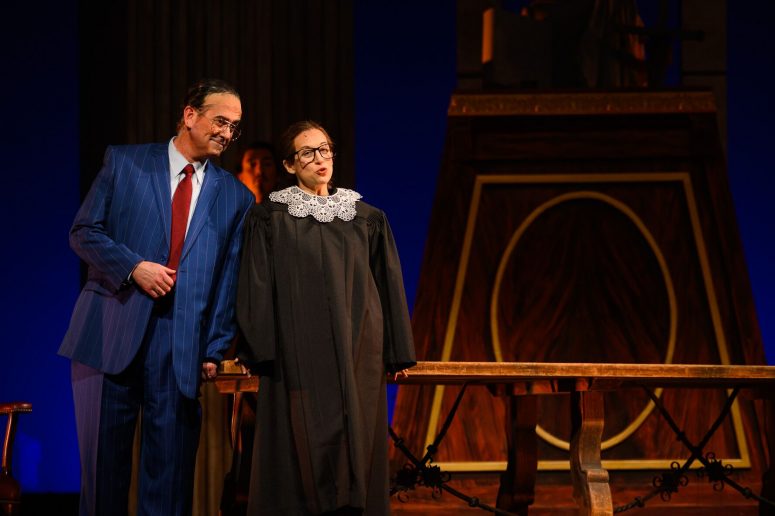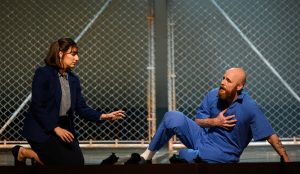
Sullivan: Trial by Jury; Wang: Scalia/Ginsburg; Heggie: Dead Man Walking. OperaDelaware, Wilmington Delaware, May 2019
OperaDelaware has transformed its seasons to once-a-year two-week festivals. What sets this company apart from all other cities is that each festival has a specific theme, with connections between all of the operas during each festival.
The company’s general director Brendan Cooke has chosen intriguing themes. In 2016 it was operas based on Shakespeare by Verdi and Faccio; in 2017 a Rossini anniversary; and in 2018 the centennial of Puccini’s Trittico paired with a modern sequel to one of Puccini’s plots.
Cooke has surpassed himself with a 2019 Festival that presents three operas concerning law and justice. This topic is especially relevant because the state, and the city of Wilmington, are hubs of legal professionals.
One production is a double bill of Trial by Jury and Scalia/Ginsburg. Both of these short operas are courtroom comedies, created 140 years apart, and Scalia/Ginsburg includes parody of the earlier opera. They make a perfect fit. It’s note-worthy that no other company previously put these two pieces together.
Trial by Jury is the first hit by composer Arthur Sullivan and librettist W. S. Gilbert. It premiered in London in 1875. The satirical story concerns a breach-of-promise lawsuit where every man on the jury, plus the judge, falls in love with the female plaintiff. Gilbert had practiced as a lawyer and his spoof of courtroom proceedings is specific and sharply cutting. (In the Victorian era, a man could be required to pay compensation if he failed to marry a woman to whom he had proposed.)
Derrick Wang, who wrote the words and music for Scalia/Ginsburg, also is a lawyer. He has a more serious purpose than Gilbert but he cloaks his topic with humor as he satirizes the musical styles of Gilbert & Sullivan, Handel, Mozart, Rossini, Verdi and Puccini. The story is a battle between the genders (think of Bobby Riggs versus Billie Jean King) contrasted with warm personal friendship. Justices Antonin Scalia and Ruth Bader Ginsburg are known as avid opera lovers who shared that passion even though their legal views were radically different.
Wang’s libretto makes explicit references to legal cases that came before the Supreme Court, which adds depth to the work. Because these productions are in Wilmington, a corporate base for many lawyers, much of the audience was knowledgeable and involved. The locale made the references — and the choice of subject — especially apt.
The other stage production in this festival is Dead Man Walking, about a convicted murderer on death row and the nun who becomes his spiritual adviser. In contrast to the humor of the other two operas, this is a grim drama with graphic violence. Dead Man Walking is one of the most produced operas of the past twenty years, but this is its first appearance in the Wilmington or Philadelphia areas. It’s based on the real experiences of Sister Helen Prejean, as related in her book and a 1995 movie starring Susan Sarandon as the nun. Sister Helen attended the Delaware production and spoke at a connected event.
The first-rate production is vividly directed by Octavio Cardenas, with a set by Jefferson Ridenour dominated by sliding metal prison gates. Mezzo Aleks Romano is convincing as Sister Helen who reluctantly agrees to console the convict and gradually becomes his advocate and friend. Tim Mix is sensational as Joseph De Rocher, the invention of librettist Terrence McNally. He is a composite of two death row convicts befriended by Sister Helen. Mix is tall and muscular, the image of a menacing villain. His baritone voice is powerful as he sings his big aria while doing pushups.
Romano expresses the fears and confusion of the novice who wants to ease the last days of the prisoner. Two of the best moments in the opera are scenes where she is accosted by the parents of the murderer’s young victims. These confrontations keep the opera from being a one-sided argument for prisoners’ rights and against the death penalty. The parents’ and Sister Helen’s contrasting points of view are expressed in a musically compelling quintet.
Dead Man Walking was the first big success by Jake Heggie, who has gone on to write the opera Moby Dick and many independent songs. He writes well for voice and exceptionally well for orchestra. His palette is tonal and accessible, including some influence of Gian Carlo Menotti and Benjamin Britten plus touches of gospel and rock. Conductor Jerome Shannon brought rich sound from the orchestra. Excellent support came from Adrienne Danrich as Sister Rose, and Jenni Bank as the convict’s mother.
McNally’s libretto expresses the religious commitment of Sister Helen while also providing the shock of on-stage rape and murder and the graphic execution of the convict. It does have a flaw as it shows repeated efforts by the nun to get De Rocher to confess his guilt. Whether or not he personally pulled the trigger shouldn’t matter, as he clearly was a participant in the crime (which we saw at the opening of the opera) and because religion supposedly teaches compassion for all people, innocent or guilty, as they are about to die.
The comic double bill was a joy. Gilbert & Sullivan aren’t receiving as many performances these days, and it was good to see this example of their work, directed briskly by Cynthia du Pont Tobias. Ben Lowe was a standout as the judge who delivers the earliest G&S biographical patter song. Anaïs Naharro-Murphy and Colin Doyle were appealing as the quarreling lovers and Sara Jobin led a bubbling rendition of the music — in Trial by Jury and in Scalia/Ginsburg.
In that Supreme Court battle of wits, the diminutive soprano Jennifer Zetlan looked astonishingly like Justice Ginsburg, sang with beauty, and acted with panache. Tenor Brian Cheney was costumed and directed (by Fenlon Lamb) to make a convincing impersonation of Justice Scalia, and he revealed a strong and flexible voice. Ben Wager (who also was a fine prison warden in Dead Man Walking) sang and acted authoritatively as the Commentator.
Below, Romano & Mix in Dead Man Walking:
